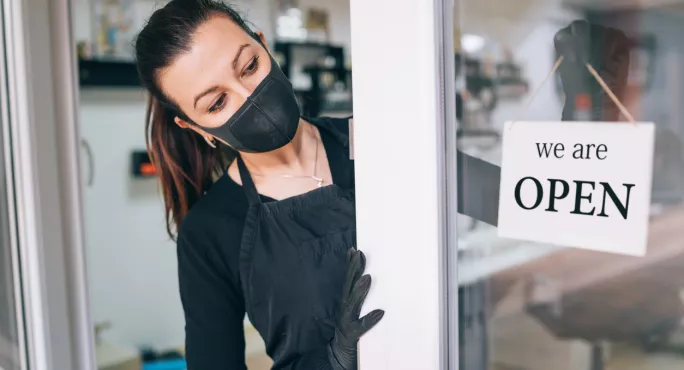- Home
- What face masks in public mean for pupils with SEND
What face masks in public mean for pupils with SEND

As lockdown eases, new systems of operating are being established and embedded across society: hand hygiene, social distance. And, last night, the government announced that it will be mandatory to wear face masks in shops from next week onwards.
For the neurotypical, these changes can seem variously reassuring, irritating or sinister.
Within the special educational needs and disabilities (SEND) community, however, modifications may represent significant challenges and barriers to interaction.
The latest census figures show that 12.1 per cent of all nursery and schoolchildren in England have special educational needs. Processing and sensory impairments therefore affect a significant minority of our school population.
Almost 83,000 pupils with an education, health and care plan are on the autism spectrum. For these pupils, in particular, many of the recent changes to society will be particularly difficult.
SEND: The challenge of face masks
The texture, feel and action of putting on a mask - leaving it on, not fidgeting with it - represents a significant challenge for some with reactions and responses associated with the autism spectrum.
Wearing masks (and gloves) can provoke sensitivity issues. Similarly, seeing other people wearing them can elicit phobic reactions or rejection responses.
Pupils on the autism spectrum may require intensive, prolonged interventions to allow them to accept mask-wearing as part of their day, and to make masks mundane or normal.
Masks will be difficult, too, for hearing-impaired children. These pupils rely on lipreading and clear diction for communication. The mask, however, is a very physical barrier. Muffled voices, issuing from a hidden source, become inaudible.
Those with speech and language needs may struggle to converse or make themselves understood in a mask - impeding further their own pre-existing impediment.
In an apparently supportive measure, there are exemptions for the wearing of masks on public transport and in shops. These exemptions include those with special educational needs and disabilities.
However, a person not wearing a mask faces potential challenge by staff, police or zealous members of the public. To avoid this, they may choose to wear a badge such as an Autism Alert sticker. But this ultimately forces people to admit publicly to otherwise invisible disabilities.
Difficulties with washing hands
Many of the other changes we’ve seen since the start of this coronavirus pandemic are also challenging for SEND pupils.
Improved hand hygiene is obviously a welcome factor in the battle against the spread of the disease. However, children on the autistic spectrum, or with obsessive-compulsive disorder (OCD), may be hypersensitive to water sensations. They may actively seek to avoid contact with water, to avoid becoming overstimulated or overresponsive.
The British have prided ourselves on our ability to form an orderly queue. In today’s climate, we are honing our skills: queues are longer, socially distanced, often outdoors, including on pavements near roads.
Children with attention deficit hyperactivity disorder (ADHD), autistic spectrum conditions or other learning needs are unlikely to adapt easily. Patience is often not in their skillset.
Parents and schools learned how to best support these children in extracurricular outings during pre-Covid days. But new strategies will now be needed, or large geographical sections of society will be physically placed beyond the reach of these children.
Meanwhile, blind and visually impaired children rely on a sighted guide to navigate the world, until they develop the skills to feel and touch their own way. Social distancing is an impossibility for them and their teachers or supporting adults. And their increased use of touch more broadly puts them at increased risk of infection.
Suffering severely
In addition, pupils with special needs are more likely to suffer severely from Covid-19, if they contract the disease. Two-thirds of UK deaths from Covid-19 between 2 March and 15 May involved disabled people, according to the Office for National Statistics.
People with SEND are more likely to have underlying health conditions or risk factors, including obesity and diabetes. Identifying symptoms for those with complex or multiple special educational needs is more difficult, as they may not communicate discomfort or recognise their own sore throat and temperature.
The return to school may also be challenging for many pupils with SENDd. Last week, the Commons Education Select Committee heard that during lockdown, many students with education health and care plans, despite initially being promised seamless access to education alongside the children of key workers, found themselves excluded.
Schools offering specialist provision were forced into temporary closures; children with SEND in mainstream settings were asked to cease attending if they were unable to adhere to the requirements around hygiene and social-distancing.
Time away from school will have suited some students enormously, particularly those who find the pace and stimulation of the neurotypical world confusing. Breaking these home routines and reintegrating into - altered - school life may require significant additional support, which is potentially time-consuming and resource-heavy.
But it is important. Alterations to society look likely to be in place for the foreseeable future. As adaptations are embedded, we need to look for ways to ensure that our SEND students are not further marginalised and excluded from our school community, and from society more widely.
Deborah Hollingsworth is a teacher with 20 years’ experience in curriculum and pastoral leadership, as well as in special-school provision. She is currently an assistant Sendco in East London. She tweets as @debs_cares
Keep reading for just £1 per month
You've reached your limit of free articles this month. Subscribe for £1 per month for three months and get:
- Unlimited access to all Tes magazine content
- Exclusive subscriber-only stories
- Award-winning email newsletters



